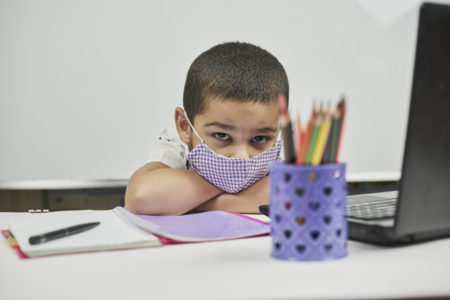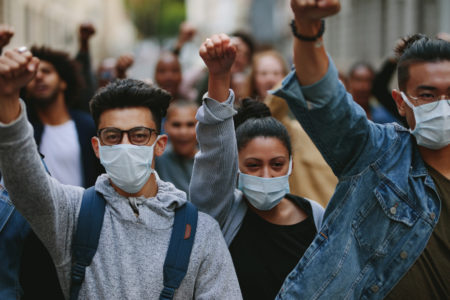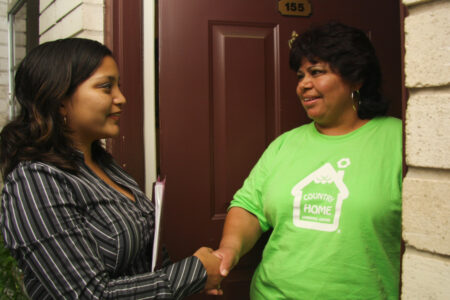
Share On Social!
Latino parents are concerned about education for their children, their economic security, and racial justice when emerging from the COVID-19 pandemic, according to new data from a report conducted by Latino Decisions and Abriendo Puertas/Opening Doors.
Parents also want government leaders to address these issues, the survey says.
“The future of our country is inextricably linked to the wellbeing of Latino families. If we don’t act now, America will face a deeper economic depression, workforce instability, and soaring school drop-out rates,” according to the policy report.
The report highlights the areas of concern and recommends policies that can address these issues.
About the Survey to Gauge Latino Parents’ Concerns amid COVID-19
Before COVID-19, many Latino families already suffered a big lack of access to support for economic and educational success, and quality healthcare, according to a Salud America! research review. This, and other health and social inequities, contribute to Latino health disparities.
Amid COVID-19, inequities and disparities are worsening.
To find out how Latino parents are responding, Latino Decisions, a Latino political opinion research firm, conducted the survey in partnership with Abriendo Puertas/Opening Doors, a program focused on bilingual and culturally competent educational material for families.
Latino Decisions surveyed 1,195 Latino families through online surveys and live telephone interviews, available in both Spanish and English.
The survey was conducted in June 2020.
Education: A Top Concern of Latino Parents
The survey found one of the biggest concerns for Latino parents is education.
“Latino families are seeing their children fall behind in school using distance learning. However, because Latino communities have been disproportionately affected by COVID-19, parents feel increased anxiety about the health risks of sending their children back to school,” according to the policy report.

Some of the key concerns for Latino parents in regard to education are fear of COVID-19 spreading in schools, children falling behind, lack of technology to support distance learning, unfamiliarity with class materials, and lack of regular access to internet.
Other studies have shown Latino students have been falling behind in math and reading classes while schools are closed for COVID-19.
To combat this growing disparity, Latino parents want more technical support, one-on-one tutoring options, more in-person or virtual time with teachers, more direction on creating at-home learning schedules, and better or more reliable internet.
“Latino parents are asking for more direct communication with teachers, better ways to monitor their students’ progress, and more tech help for online learning tools,” according to the policy report.
Economic Security: A Top Concern of Latino Parents
Another major concern for Latino parents coming out of the pandemic is economic security.
“The job loss in the wake of COVID-19 closures has been catastrophic for Latino communities. Immigrant parents, whose jobs are often essential but unstable, have been the hardest hit. Immigrant and mixed-status families were disqualified from federal stimulus aid, further exacerbating their precarious financial security,” according to the policy report.
Many Latino families are most concerned about a loss of health insurance, having no more savings, an inability to pay rent, and the loss of a small business.
Thankfully, some organizations are stepping up to help out Latino business owners.
Another way that Latinos need financial support is through federal, state, and local government aid, especially for housing, according to the Abriendo Puertas/Opening Doors and Latino Decisions survey.
What Latino parents most need is help lowering monthly payments for housing and allowing children and undocumented immigrants who pay federal income taxes to be eligible for stimulus checks.
“The government should provide more help to support workforce and education development of adults, especially undocumented people. I really hope the U.S. continues the DREAM Act, because it was the only way I was able to grow professionally and educationally,” said Ofelia Bucio, a survey participant, according to the policy report.
Racial Justice: A Top Concern of Latino Parents
Coinciding with the COVID-19 pandemic was a moment of racial awakening in the U.S.
Many Latino parents used the Black Lives Matter movement to speak with their children about racial justice.
“African Americans are most likely to be involved in police shootings, with Latinos close behind. Latino men are 1.4 times more likely to be killed by a police officer than whites. In response to the murder of George Floyd on May 25, 2020, and the resulting protests and civil unrest, Latino parents are taking the opportunity to talk with their families about the similar violence they’ve experienced, and how Black Lives Matter is a collective struggle,” according to the policy report.

According to the report, many Latino parents are concerned their children will also face excessive police force and agree that Latinos face similar experiences with law enforcement as Black people.
Unfortunately, Latinos do experience racial and ethnic discrimination, which has negative consequences in life.
“Racial/ethnic discrimination impacts educational attainment, which, in turn, impacts future educational, health, social, and career opportunities for people of color,” according to a Salud America! research review.
We saw during the Black Lives Matter protests that Latinos were getting engaged and involved as well.
“It’s not just Black people being murdered by police. Hispanics are dying, too,” Fernando Garcia, executive director of the Border Network for Human Rights (BNHR), told El Paso news station WWLP 22.
For policy suggestions regarding social justice and police reform, the survey’s policy report recommends reducing police presence in schools, enacting nationwide restorative justice programs, and reforming police responses to mental health crises.
How Else Can We Improve Equity for Latinos?
The policy suggestions in the Abriendo Puertas/Opening Doors and Latino Decisions survey recommend ways that state and federal governments can help bring equity to Latinos regarding education, economic security, and racial justice.
For example, some of the policy suggestions are:
- Implement support similar to the Broadband Technologies Opportunity Program (2009) to address more systemic inequalities in internet access for rural families
- Expand CARES Act to include immigrant families.
- Re-allocate funding for law enforcement in schools to teacher training and mental health professionals who are experts in addressing mental health conflicts, juvenile disputes, and misbehavior in schools.
Until more policy helping Latinos is passed, we must keep advocating for Latinos and for health equity for all people.
You can help advocate for better education and racial justice by downloading the Health Equity Report Card from Salud America!
The report card allows you to see what access your community has to healthcare, food, education, and other resources. You can help advocate for your neighbors and present the Health Equity Report Card to your city’s leadership!
By The Numbers
142
Percent
Expected rise in Latino cancer cases in coming years



